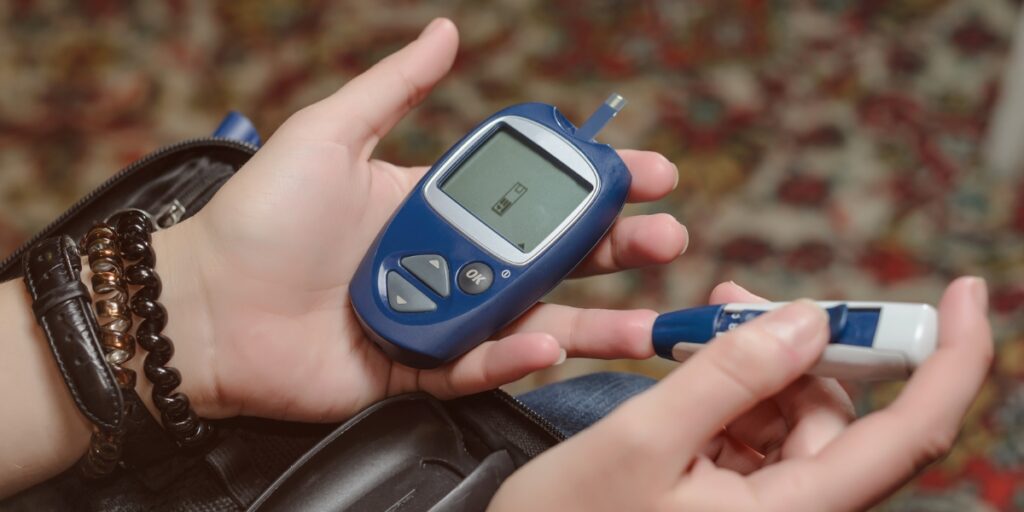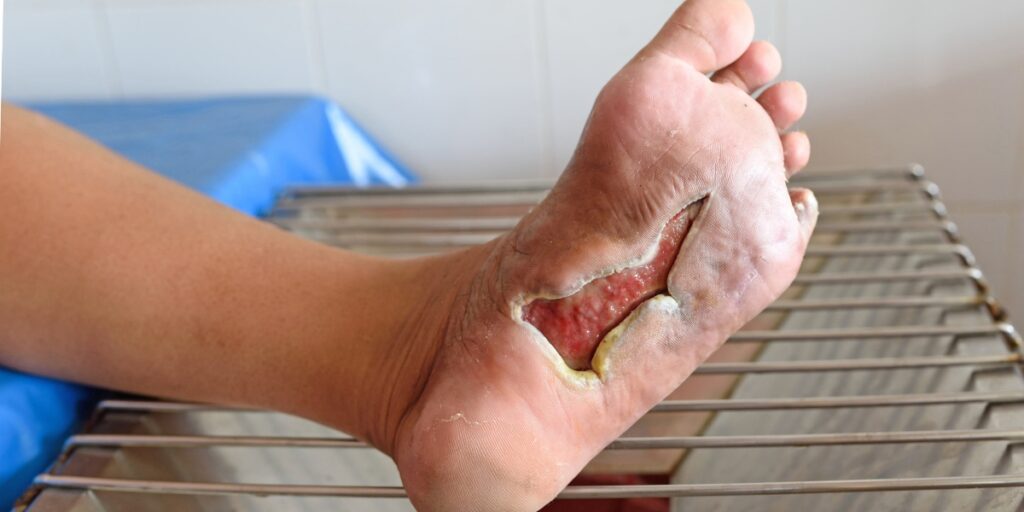Alcohol and Diabetes

The human body is a well-oiled machine that relies on a chemical balance to function correctly; both alcohol and diabetes upset that balance, and when they are combined, the results can be dangerous.
Diabetes, like alcohol use disorder, is a chronic condition that requires ongoing attention and care. Alcohol consumption can interfere with that care and cause warning signs of an impending health crisis that go unnoticed or even be the catalyst.
There are three types of diabetes:
- Type 1 diabetes– Commonly called juvenile diabetes because it mainly develops and gets diagnosed early in life. People with type 1 diabetes cannot naturally produce insulin and require regular doses. Type 1 diabetes accounts for 5-10% of all diagnosed cases of diabetes and is primarily due to genetic factors.
- Type 2 diabetes– Type 2 is the most common type of diabetes, accounting for around 90% of all diabetes diagnoses. Type 2 tends to develop in middle-aged to older adults to varying degrees of severity. People with type 2 either produce insufficient amounts of insulin, or their body is insulin resistant, meaning it cannot efficiently use the insulin it does make. Lifestyle changes and medical management can help keep type 2 diabetes in check.
- Gestational diabetes– Pregnant people can develop diabetes with no previous risk factors. Gestational diabetes generally disappears after pregnancy, but some people develop lifelong type 2 afterward. For many reasons, including the risk of fetal alcohol syndrome and miscarriage, it is not safe to drink alcohol while expecting.
Outside of completely abstaining from alcohol, there are some precautions you can take when you drink to reduce the risk of how alcohol affects diabetes, including:
- Drink a maximum of two drinks
- Drink slowly
- Eat safe foods before or during
- Monitor your blood glucose levels
- Stay hydrated
Much like different types of diabetes exist, there is a whole spectrum of drinking patterns, behaviors, and alcohol use disorders. A person with diabetes doesn’t need to be a chronic drinker to experience the adverse effects of alcohol; heavy drinking, binge drinking, and alcoholism all present unique threats to people with diabetes.
Drinking Alcohol and Diabetes: Effects on the Body
Both drinking alcohol and diabetes have complex effects on the body. When people with diabetes drink, the results can cause short-term and long-term health conditions. The most dangerous effect alcohol can have on people with diabetes is drastic changes in blood sugar levels.
The core issue of all types of diabetes is insulin production and processing. Anything you consume, including alcohol, is broken down and processed by the body and turned into energy or glucose. Insulin is the chemical responsible for regulating blood glucose levels and helping the liver store blood glucose for energy later. When alcohol enters the body, the liver filters it, interfering with when and how it releases glucose, leading to blood sugar changes.
Whether alcohol causes glucose to increase or decrease will depend on several factors, including:
- Amount of alcohol consumed
- Type of alcohol ingested
- Amount and type of food eaten
- Medications
Low blood sugar is a condition called hypoglycemia. If you drink alcohol on an empty stomach, it can lead to hypoglycemia quickly. Some people have hypoglycemia unawareness, causing them not to realize when their blood glucose levels are low. If glucose levels drastically and suddenly drop or stay low for an extended period, hypoglycemia can lead to seizures, coma, and death.
On the other end of the spectrum are too-high blood sugar levels, known as hyperglycemia. Drinking moderate amounts of alcohol, one to three drinks, can cause high blood sugar. Additionally, not all alcohol is equal; sugar-heavy beverages or ones with a lot of calories and carbs, like beer, sweet wine, and some mixed alcoholic drinks, cause blood sugar to increase faster than others.
Having alcohol on a full stomach or consistent drinking and a rich diet increases the odds of hyperglycemia. Hyperglycemia occurs a few hours after drinking or over several days in the case of chronic drinkers and high-functioning alcoholics. In general, hyperglycemia doesn’t escalate as quickly as hypoglycemia. Left untreated, it can cause long-term damage and health issues, including coma and organ failure.
The symptoms of both too-high and too-low blood sugar levels often feel similar to being drunk, causing them to go unnoticed to unaddressed, especially by onlookers. The American Diabetes Association encourages people with diabetes to wear medical ID bracelets or tags so emergency responders know how to treat them properly.
A person’s blood alcohol content (BAC) can continue to rise even after they stop drinking, and as it does, the blood glucose levels continue to change.
Regardless of medical conditions, anyone who appears heavily intoxicated is at risk of developing alcohol poisoning and shouldn’t be left alone.
Always call 911 if you believe someone is experiencing an emergency.

Type 2 Diabetes and Alcohol
People with type 2 diabetes are the most common and the most likely to report drinking alcohol regularly. Numerous National Institutes of Health (NIH) studies have shown a direct relationship between alcohol use and poor diabetes self-care.
Diabetes self-care behaviors include:
- Regular glucose level checks
- Adhering to dietary needs
- Exercising regularly
- Following medication routines
- Regular medical appointments
Moderate, binge and heavy drinkers consistently reported neglecting some or all self-care behaviors. The lack of maintenance can be attributed to alcohol making people forgetful, impairing judgment, increasing mental health issues, and contributing to the fear of poor treatment from medical professionals due to the stigma of addiction.
Because type 2 diabetes generally doesn’t develop until middle age, many people have already developed alcohol use disorders and struggle to overcome them, even when they face additional health conditions.
The Health Risks of Alcohol and Diabetes
Alcohol does not cause diabetes but can worsen existing risks and cause additional ones, especially long-term ones. People with diabetes who want to stop drinking are at risk of complicated withdrawal symptoms, including alcohol withdrawal syndrome.
The health risks of alcohol and diabetes include:
- Decreased response to medications
- Dehydration
- Cognitive difficulties
- Loss of coordination
- Injuries from falling or losing consciousness
- Slow healing wounds
- Dangerous cholesterol levels
- Difficulty managing blood pressure
- Kidney disease
- Heart disease
- Pancreatitis
- Peripheral neuropathy (nerve damage)
- Impotence
- Diabetic retinopathy (eye damage and blindness)
- Amputation

Treating Alcohol Use Disorder in Diabetics
Struggling to control your alcohol use disorder and manage diabetes can feel overwhelming and isolating, but you don’t have to suffer alone; professional help is available.
At Northridge Addiction Treatment Center, we treat substance use and co-occurring mental health disorders with treatment plans tailored to your needs. We provide onsite medical detox to manage your withdrawal symptoms safely, surrounded by around-the-clock medical care and professional support.
Our serene, private residential treatment facility provides fresh and healthy chef-catered meals. We work closely with you to develop skills, strategies, and habits that empower you to take charge of managing your addiction and health.
The path to your recovery is a phone call away. Reach out today to speak with one of our caring treatment specialists. They are eager to get you the help you need.
Find Meaningful Recovery
Our caring and compassionate specialists are eager to help you comfortably navigate this journey to recovery. Our individualized treatment plan, programs, and therapies may be a perfect match for you or your loved one. Let us assist you in living the happy life you deserve. It starts with a phone call.




